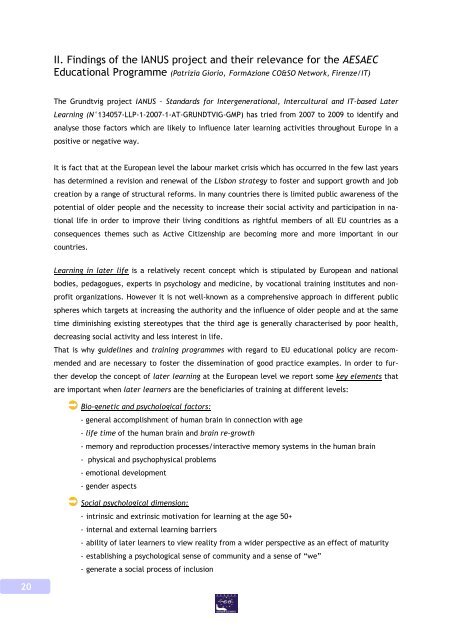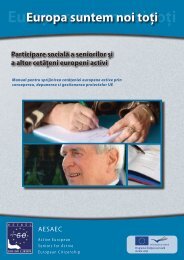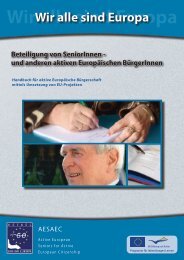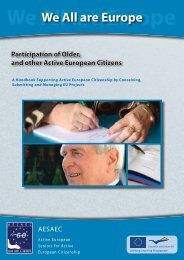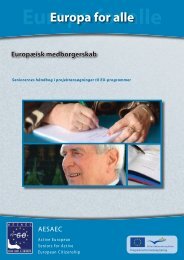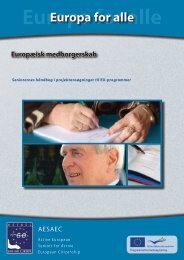We All are Europe - AESAEC
We All are Europe - AESAEC
We All are Europe - AESAEC
Create successful ePaper yourself
Turn your PDF publications into a flip-book with our unique Google optimized e-Paper software.
II. Findings of the IANUS project and their relevance for the <strong>AESAEC</strong><br />
Educational Programme (Patrizia Giorio, FormAzione CO&SO Network, Firenze/IT)<br />
The Grundtvig project IANUS – Standards for Intergenerational, Intercultural and IT-based Later<br />
Learning (N°134057-LLP-1-2007-1-AT-GRUNDTVIG-GMP) has tried from 2007 to 2009 to identify and<br />
analyse those factors which <strong>are</strong> likely to influence later learning activities throughout <strong>Europe</strong> in a<br />
positive or negative way.<br />
It is fact that at the <strong>Europe</strong>an level the labour market crisis which has occurred in the few last years<br />
has determined a revision and renewal of the Lisbon strategy to foster and support growth and job<br />
creation by a range of structural reforms. In many countries there is limited public aw<strong>are</strong>ness of the<br />
potential of older people and the necessity to increase their social activity and participation in national<br />
life in order to improve their living conditions as rightful members of all EU countries as a<br />
consequences themes such as Active Citizenship <strong>are</strong> becoming more and more important in our<br />
countries.<br />
Learning in later life is a relatively recent concept which is stipulated by <strong>Europe</strong>an and national<br />
bodies, pedagogues, experts in psychology and medicine, by vocational training institutes and nonprofit<br />
organizations. However it is not well-known as a comprehensive approach in different public<br />
spheres which targets at increasing the authority and the influence of older people and at the same<br />
time diminishing existing stereotypes that the third age is generally characterised by poor health,<br />
decreasing social activity and less interest in life.<br />
That is why guidelines and training programmes with regard to EU educational policy <strong>are</strong> recommended<br />
and <strong>are</strong> necessary to foster the dissemination of good practice examples. In order to further<br />
develop the concept of later learning at the <strong>Europe</strong>an level we report some key elements that<br />
<strong>are</strong> important when later learners <strong>are</strong> the beneficiaries of training at different levels:<br />
Bio-genetic and psychological factors:<br />
- general accomplishment of human brain in connection with age<br />
- life time of the human brain and brain re-growth<br />
- memory and reproduction processes/interactive memory systems in the human brain<br />
- physical and psychophysical problems<br />
- emotional development<br />
- gender aspects<br />
Social psychological dimension:<br />
- intrinsic and extrinsic motivation for learning at the age 50+<br />
- internal and external learning barriers<br />
- ability of later learners to view reality from a wider perspective as an effect of maturity<br />
- establishing a psychological sense of community and a sense of “we”<br />
- generate a social process of inclusion<br />
20


